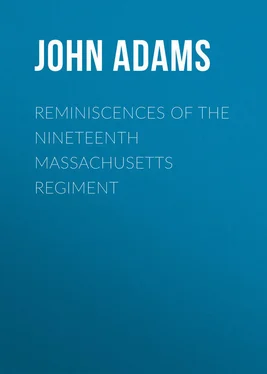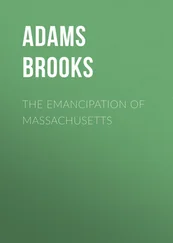John Adams - Reminiscences of the Nineteenth Massachusetts regiment
Здесь есть возможность читать онлайн «John Adams - Reminiscences of the Nineteenth Massachusetts regiment» — ознакомительный отрывок электронной книги совершенно бесплатно, а после прочтения отрывка купить полную версию. В некоторых случаях можно слушать аудио, скачать через торрент в формате fb2 и присутствует краткое содержание. Жанр: foreign_antique, foreign_prose, Историческая проза, на английском языке. Описание произведения, (предисловие) а так же отзывы посетителей доступны на портале библиотеки ЛибКат.
- Название:Reminiscences of the Nineteenth Massachusetts regiment
- Автор:
- Жанр:
- Год:неизвестен
- ISBN:нет данных
- Рейтинг книги:4 / 5. Голосов: 1
-
Избранное:Добавить в избранное
- Отзывы:
-
Ваша оценка:
- 80
- 1
- 2
- 3
- 4
- 5
Reminiscences of the Nineteenth Massachusetts regiment: краткое содержание, описание и аннотация
Предлагаем к чтению аннотацию, описание, краткое содержание или предисловие (зависит от того, что написал сам автор книги «Reminiscences of the Nineteenth Massachusetts regiment»). Если вы не нашли необходимую информацию о книге — напишите в комментариях, мы постараемся отыскать её.
Reminiscences of the Nineteenth Massachusetts regiment — читать онлайн ознакомительный отрывок
Ниже представлен текст книги, разбитый по страницам. Система сохранения места последней прочитанной страницы, позволяет с удобством читать онлайн бесплатно книгу «Reminiscences of the Nineteenth Massachusetts regiment», без необходимости каждый раз заново искать на чём Вы остановились. Поставьте закладку, и сможете в любой момент перейти на страницу, на которой закончили чтение.
Интервал:
Закладка:
John G. B. Adams
Reminiscences of the Nineteenth Massachusetts regiment
PREFACE
For thirty-four years I have waited patiently for some one to write a history of the 19th Regiment Massachusetts Volunteers, but fearing that it may never be accomplished, I have concluded to send out this story. I do not dignify it by calling it a history. It is simply a soldier’s story, told by one of the “boys.” Most of it is written from memory. The account of prison life is taken from an imperfect diary, kept by the writer while a prisoner of war.
I sincerely hope the publication of this volume will inspire other comrades, and that from the memories thus evoked some one may gather further material whereby the deeds of the men who so bravely followed the flags of the State and Nation for four long, weary years may be preserved.
JOHN G. B. ADAMS.CHAPTER I
At the breaking out of the war I was a resident of the quiet but patriotic town of Groveland. Sumter had been fired upon and all was excitement. I could not work, and on the 18th of April, 1861, walked to Haverhill with my elder brother and Mark Kimball. We went to the armory of the Hale Guards, who were making active preparations to march, and I returned home that night resolved to go with them if possible. The next day we walked to Haverhill again, and I at once interviewed Captain Messer, but was informed that the company was more than full, so I could not go with it.
I had said nothing to my brother or Mark of my intention, but as we were walking home I found that we all had the same desire, – to enlist at once. We talked the matter over and concluded that as Company A of the 1st Battalion of Rifles, an old militia company located in West Newbury, and then under arms, would soon be ordered away, we would join it. That night we walked to West Newbury (five miles), found the company at the armory in the town hall and enrolled our names. Company A was one of three that composed the 1st Battalion of Rifles, commanded by Maj. Ben. Perley Poore. They had been organized several years and were known as “Poore’s Savages.” They were armed with Winsor rifles and sabre bayonets, the rifle and bayonet weighing about fifteen pounds. The uniform was dark green, trimmed with light green, and as I donned it for the first time it was hard to tell which was the greener, the soldier or the uniform. We had a peculiar drill. Most of it, as I can remember, consisted of running around the town hall in single file, giving an Indian war-whoop and firing into the corner of the hall as we ran.
I was a soldier now. I did not walk the streets as I had done, but marched , always turning “a square corner.” People grasped me by the hand and congratulated me on my courage. (I did not see where the courage came in.) The Sons of Temperance, of which my brother Isaac and myself were members, presented us at a public meeting with two suits of underclothes and havelocks, housewives, testaments, etc., so that before we received our army outfit we had enough to load a mule.
We waited for orders to march, but none came, and from being heroes we began to be looked upon with disgust, and we were the most disgusted of all. As we would meet friends on the street they would say, “Is it not about time to have another public meeting to bid you fellows good-by?” or, “You will want some more shirts before you leave.” So mortified did we become that, instead of marching down through the village to drill, we sneaked away through a back street.
The company began to get demoralized. Men were leaving every day, going to other States or to regiments that had been ordered to the front. At last we rebelled, and sent our officers to the Governor with a vote passed by the company, that unless we were ordered into camp at once we would disband. After a few days we were furnished with a large tent for the men, a wall tent for the officers and a supply of rations. Our camp was located on the land of one of our members, Private Sylvester, and was named “Camp Sylvester.” We were without arms except three guns for guard duty, as our old Winsors had been turned in. Company A was officered as follows: Captain, Moses P. Stanwood; First Lieutenant, J. Warren Brown; Second Lieutenant, Benjamin Wilson; Third Lieutenant, Isaac H. Boyd; Fourth Lieutenant, Jones Frankle. The third and fourth lieutenants were soon discharged, as army regulations only provided for two. Lieutenant Boyd went into the ranks, Lieutenant Frankle was made major of the 17th Massachusetts.
Our discipline in Camp Sylvester was not as strict as it was later in the war. We mounted one guard. After we had been once around we concluded that the lieutenants ought to stand their share, so we put them on. One night we caught a calf and after the officers were asleep we turned him into their tent. We did many things that later would have sent us to the guard-house.
About the second week in July we were ordered to Lynnfield to join the 19th regiment. We were the second company in camp, Company C of Rowley arriving about two hours before us. Our tents were a peculiar pattern, neither wall nor A, but between the two, having accommodations for ten men, and each tent had three windows or ventilators. For a time we were under the command of Col. Lyman Dyke, who also commanded the 17th regiment, located near us.
At Lynnfield I was promoted to sixth corporal, and my troubles began. I was one day detailed for guard, the 17th and 19th regiments doing guard duty together. When I posted my relief I had one more man than posts, so I made a new post. The officer of the day asked me what I did with the supernumerary. I said that I put him on in rear of the ice-house. He desired to know who gave me authority to create new posts, and I replied that I supposed I was to use up my men. As soon as the guards were posted they began to call “Corporal of the Guard.” When I went to them they wanted a drink of water. I asked the officer of the day if it was my duty to carry water to them. He said it was. So I toted the water pail the two hours my relief was on. At night the men went to their quarters. I found where they slept, and made arrangements to call them. I would put my head into a tent and call, “Third relief!” and instead of the men coming out, a boot with an oath came at me. As I could not get enough for a relief I turned out the drummer and had him beat the long roll. This brought out the officer of the day but very few of the men, as they did not know what it meant any more than I did. Collecting what I could we started to relieve the guard, but I soon found that I had more than men enough, as at nearly every post we found the musket stuck into the ground and the man missing. When relieved in the morning I was disgusted with being an officer, and longed for the freedom of a private.
Recruits were fast arriving. Company A went into camp with about sixty men, and every day some new man was voted in, as we had not given up the old militia method of electing our members. Skeleton companies were arriving, consisting of an officer and a few men, who were given a letter and assigned a place in line. Among the first to arrive was Captain Mahoney. His company was given the letter E. Captain Mahoney was an energetic officer and anxious to drill his men. Long before daybreak, with his first sergeant, McNamara, he would turn out the recruits, and as we lay in our tents we could hear him calling, “Left! Left! McNamara, tread on that man’s heels!”
It was not very long before we had the required number of companies, the last to arrive being the Boston Tiger Fire Zouaves, and my story from this point will include the regiment as well as Company A.
One day in August we saw a military man looking over the camp. We soon learned that it was Colonel Hincks, who had just returned from three months’ service with the 8th Massachusetts. In a few days he was assigned to the command of the 19th and from that moment what had been a uniformed mob became a regiment of soldiers. With him came Lieutenant-Colonel Devereaux, who had been captain of the Salem Zouaves, and soon after Maj. Henry J. How. One of the Salem Zouaves was assigned to each company as a drill-master, and we soon saw that our three months’ drilling had been worse than useless, as we had to begin over again, and it “was hard to teach old dogs new tricks;” but the Zouaves won our respect and every man was anxious to do his best. Very soon a change took place in the line officers, – a Zouave was commissioned in nearly every company. Company A retained Captain Stanwood, but lost both lieutenants, C. M. Merritt, who had been an officer in the 8th, being made first lieutenant, and Isaac H. Boyd, who had enlisted as a private, second lieutenant.
Читать дальшеИнтервал:
Закладка:
Похожие книги на «Reminiscences of the Nineteenth Massachusetts regiment»
Представляем Вашему вниманию похожие книги на «Reminiscences of the Nineteenth Massachusetts regiment» списком для выбора. Мы отобрали схожую по названию и смыслу литературу в надежде предоставить читателям больше вариантов отыскать новые, интересные, ещё непрочитанные произведения.
Обсуждение, отзывы о книге «Reminiscences of the Nineteenth Massachusetts regiment» и просто собственные мнения читателей. Оставьте ваши комментарии, напишите, что Вы думаете о произведении, его смысле или главных героях. Укажите что конкретно понравилось, а что нет, и почему Вы так считаете.












